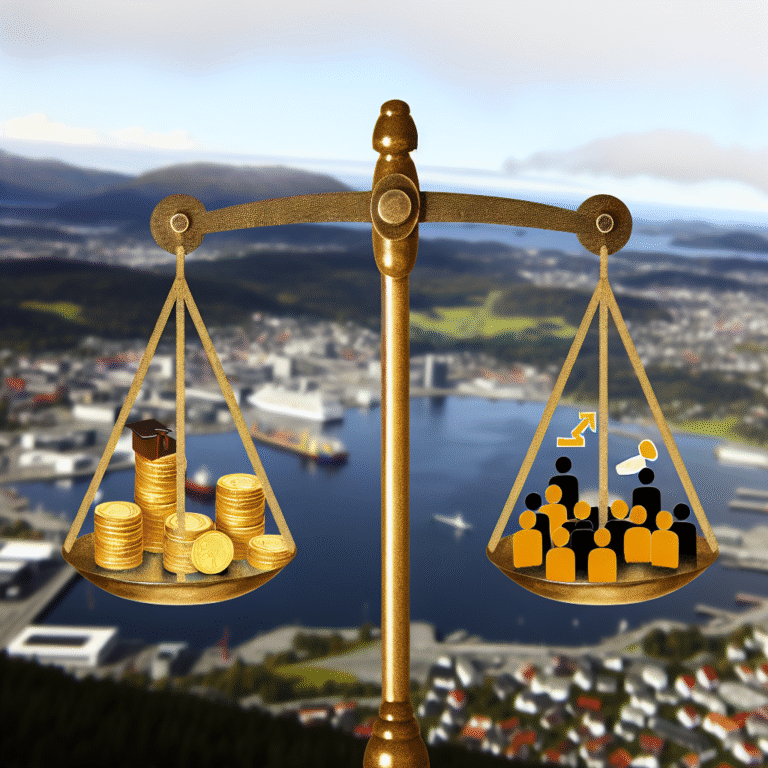Case is updated
– In this proposal, we find common ground on several key issues. The trade union deduction is being bolstered rather than reduced. Prices for kindergartens will remain stable instead of rising, and we are closing tax loopholes rather than widening them, Martinussen told NTB.
Also read
Government to introduce climate tax on fertilizer
However, we’re still far from the finish line. The rising costs over recent years have put immense pressure on everyday people. Banks and grocery chains are making profits in the billions, adds Martinussen.
Many are facing financial strain, leading to what she describes as “a more divided Norway.” She emphasizes that unresolved tasks remain for negotiations. “Red is prepared to make an impact on this budget, negotiating both constructively and firmly,” she asserts.

Frp’s fiscal spokesman Hans Andreas Limi is highly critical of the government’s budget proposal.Photo: Lise Åserud
Frp: Everyday Life Becoming More Expensive
Limi contends that the government’s plans will result in minimal tax relief for citizens while simultaneously raising costs across several essential areas.
“Ordinary wage earners can expect an average of just two kroner a day in tax reductions, while costs for vehicles, diesel, and medical expenses will increase. There’s little indication that relief will be on the horizon for everyday people next year either,” Limi cautions.

Also read
AP to implement a fee for food production
Limi argues that despite the government projecting an expenditure of nearly NOK 580 billion in oil revenue for 2026, they have not allocated sufficient funds to bolster security.
“This is just the beginning,” Limi notes, adding that the true impact lies in the final sum of the “tutti-frutti” bill. He emphasizes that it’s common knowledge that the Labor Party is likely to negotiate with factions poised to raise taxes significantly for both ordinary citizens and Norwegian businesses, which he fears will lead to chaos and insecurity.

Ingrid Liland (MDG) in Vandrehallen before Finance Minister Jens Stoltenberg’s financial speech. Photo: Lise Åserud
MDG: Comical Governance
“It’s rather comical to label this as safe governance,” remarks Ingrid Liland, the negotiating leader for MDG, in her critique of the government’s budget proposal.
She contends that for true job security and future value creation, we must develop a phase-out plan for oil and gas, make considerable investments in public transport, and impose costs on environmentally damaging activities.

Also read
Government to introduce climate tax on fertilizer
Liland insists that the government will negotiate with a historically significant MDG and expresses her hope for new, more effective approaches from them.
She openly criticizes the government’s lack of innovation, stating, “It seems Stoltenberg has simply recycled the budget from when he was Finance Minister back in 1997,” pointing out cuts in funding for energy efficiency, electric vehicle incentives, and green industry initiatives.
The Right: Failing to Prepare Norway for the Future
Nikolai Astrup, the Right’s fiscal spokesman, warns that in a few years, our expenditures will outpace our revenues, yet the finance minister appears unfazed. “If we aim to fund renovations of the Armed Forces, provide quality welfare, and ensure public safety, the government must prioritize bolstering the economy’s growth capacity while controlling expenses,” he argues in a press release to NTB.
Astrup expresses concern that the police are not receiving adequate resources to combat increasing crime in an environment marked by street shootings, grenade attacks, and gangs exploiting children and youth.
“The Labor Party is entering negotiations with those intent on increasing expenditures, raising taxes, and tapping further into oil revenues. This approach does not reflect safe stewardship,” he concludes.
(© NTB)

